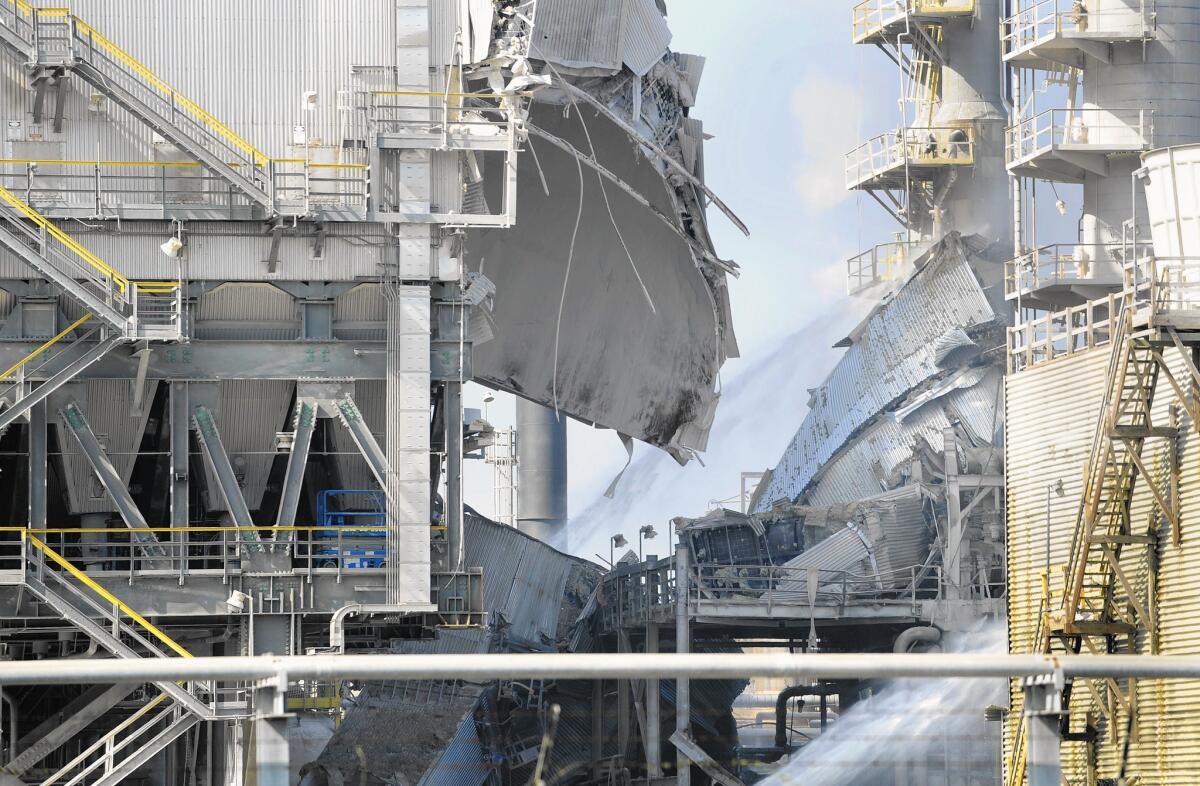Exxon Mobil scraps plans for temporary fix to damaged Torrance refinery

Just when Southern California motorists were expecting to see some relief from high gasoline prices in the next few weeks, they now may have to wait well into next winter — at least.
Exxon Mobil Corp., still at loggerheads with air quality regulators over a short-term fix for the company’s damaged Torrance refinery, appears poised to build a new pollution-control system that meets antipollution specifications, several experts briefed on the matter said.
One of them, oil industry analyst Bob van der Valk, said he learned this week from people who knew about the plans that Exxon has decided to abandon short-term repairs and pursue a longer-term approach that would bring the plant back to full capacity in mid-February.
“They’re dead in the water for gasoline,” Van der Valk said. “They took everybody off the [short-term] project.”
Exxon executives would not comment except to say the company has been working with all agencies and will continue to work with the air quality regulators.
Since an explosion damaged the refinery in February, Exxon has been proposing to use an old pollution-control device, one that doesn’t meet air quality standards, to get the plant operating while it worked on a permanent repair.
The refinery produces a fifth of Southern California’s gasoline but is operating at less than 20% capacity.
Hopes ran high last week as the South Coast Air Quality Management District was set to take up Exxon’s request to use the older pollution-control device at the plant. Instead, the meeting was canceled and the AQMD indefinitely suspended hearings on repairs until Exxon responded to certain requirements, which the agency wouldn’t divulge.
Now “the ball is in [Exxon’s] court,” said Barry Wallerstein, the AQMD’s executive officer. “I don’t know what the time period is. It’s really only Exxon Mobil that knows the specific answers.”
SIGN UP for the free California Inc. business newsletter >>
Delays in the restoration of the refinery have ignited a swarm of criticism over the company’s response to state and federal investigations and threaten to keep gasoline prices in the Los Angeles area much higher than the rest of the nation.
A short-term fix could have helped lower gasoline prices in the L.A. region at a pace more in line with the decline in cost the rest of the nation has seen. Van der Valk said prices in California probably will tick lower but slowly. Pump prices in the L.A. area averaged $3.19 a gallon Tuesday while the nationwide average was $2.28.
Reps. Maxine Waters (D-Los Angeles) and Ted Lieu (D-Torrance) added to the pressure on Exxon by sending a chastising letter to the company’s chairman, Rex Tillerson, two weeks ago.
In the letter, Waters and Lieu noted that they were “deeply concerned by recent efforts by ExxonMobil to push back against the investigations by the California Division of Occupational Safety and Health and the U.S. Chemical Safety Board.”
On Aug. 13, Cal-OSHA issued 19 citations against Exxon over the refinery explosion and fined the company $566,600. Six of the citations were characterized as “willful” because the agency found that Exxon did not take action to eliminate known hazardous conditions and “intentionally failed to comply with safety standards,” Waters and Lieu wrote.
Waters and Lieu also noted that the company has failed to produce documents requested and later subpoenaed by the Chemical Safety Board.
On Tuesday, advocacy group Consumer Watchdog raised yet another concern in a letter to Gov. Jerry Brown, state Atty. Gen. Kamala Harris and U.S. Atty. Gen. Loretta Lynch. The group questioned Exxon’s decision to reassign a manager who oversaw the equipment damaged in the February explosion and told him “to stay away from the investigation and to keep quiet.”
Consumer Watchdog has called for more transparency in the operations of the state’s refineries because of the kinds of issues that have come to light at Torrance.
Exxon spokesman Todd Spitler said the company does not comment on personnel matters. He said Exxon is working on a response to Waters and Lieu.
Besides providing 20% of Southern California’s gasoline needs, the Torrance plant provides 10% of the state’s refined capacity. So the lack of production at the facility, combined with low inventories statewide, contributed to gasoline prices that have been as much as $1.50 a gallon more than the rest of the country.
After the time of the explosion, regulators had projected that the refinery would return to full service by the end of the year. But Exxon proposed an alternative, short-term strategy to increase production 60% to 65% with an old pollution-control system designed to replace one damaged in the explosion.
But regulators and Exxon have not reached agreement on a plan to ensure environmental safety.
“That would have eliminated a lot of uncertainty,” said Gordon Schremp, a senior fuels specialist at the California Energy Commission.
Schremp said there still is some good news for consumers. Enough fuel supplies are on hand for now, and refineries will be switching in November from California’s more expensive summer blend to the winter blend of gasoline, which is more widely available.
That should help keep gasoline prices in check until the Torrance refinery returns to full service. L.A.-area motorists, though, won’t see the kinds of prices predicted for the rest of the country, which are pegged at an average of $2.03 for a gallon of regular gasoline by December.
Residents living near the refinery said they want the operation thoroughly investigated.
“With the history of accidents at the refinery, it certainly appears we have many serious systemic issues in the operation of the plant,” said John Bailey, president of the Southeast Torrance Homeowners Assn., “and they need to be investigated before Exxon Mobil is granted authority by the AQMD to increase production.”
Twitter: @ivanlpenn
ALSO:
GasBuddy, G&M offer $2.15 a gallon gas in Burbank
Consumer advocates: Oil refiners manipulate California gas prices
Why gas prices in California are so much higher than elsewhere in U.S.
More to Read
Inside the business of entertainment
The Wide Shot brings you news, analysis and insights on everything from streaming wars to production — and what it all means for the future.
You may occasionally receive promotional content from the Los Angeles Times.











